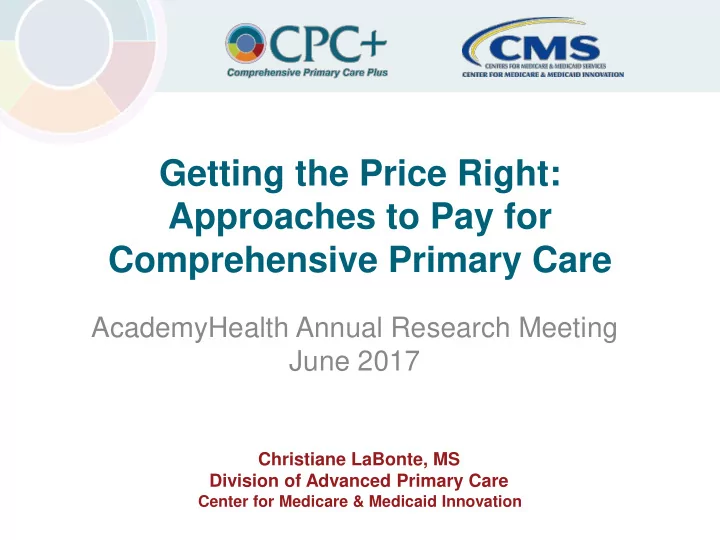

Getting the Price Right: Approaches to Pay for Comprehensive Primary Care AcademyHealth Annual Research Meeting June 2017 Christiane LaBonte, MS Division of Advanced Primary Care Center for Medicare & Medicaid Innovation 1 Comprehensive Primary Care Plus Center for Medicare & Medicaid Innovation
Agenda 1) Comprehensive Primary Care (CPC): 2012-2016 2) CPC+: 2017-2022 3) CPC+ Care Delivery Transformation 4) CPC+ Payment Design to Support Care Delivery 5) Primary Care Valuation Study For more information: https://innovation.cms.gov/initiatives/Comprehensive-Primary-Care-Plus 2 Comprehensive Primary Care Plus Center for Medicare & Medicaid Innovation
CPC Engaged Numerous Partners Across Seven Regions PARTNERS 445 Practice Sites 2137 physicians 36 Public and Private Payers REGIONS Arkansas Ohio/Northern KY Colorado Hudson Valley, NY New Jersey Greater Tulsa, OK Oregon PATIENTS ~327,000 Medicare ~2.7 Million Active ~79,000 Medicaid Beneficiaries Patients Beneficiaries 3 Comprehensive Primary Care Plus Center for Medicare & Medicaid Innovation
Comprehensive Primary Care Plus America’s Largest -Ever Initiative to Transform Primary Care ROUND 1 5 2 14 2,891 Years Tracks Regions Practice Sites 13,090 >1.76 million 53 58 Clinicians Medicare Beneficiaries Payer Partners HIT Vendor Partners ROUND 2 5 4 12 Up to 1,000 Years New Regions New Payers New Practices From 2018-2022 Selected based on payer Including 5 supporting Depending on commitment to partnership Round 1 regions interest and eligibility 4 Comprehensive Primary Care Plus Center for Medicare & Medicaid Innovation
Five Functions Guide CPC+ Care Delivery Transformation Comprehensiveness Access and Continuity Care Management and Coordination Patient Assignment to Coordination with Patient Risk Stratification Care Teams Other Providers Hospital/ED Discharge Integrated 24/7 Patient Access Follow-Up Behavioral Health Care Plans for Chronic Psychosocial Out-of-Office Care Options Disease Patients Needs Assessment Patient and Caregiver Planned Care and Engagement Population Health Track 1 requirements Practice and Patient and Family Additional requirements Advisory Councils Payer Data Insight for Track 2 Self-Management Full Care Team Data Review Support Tools 5 Comprehensive Primary Care Plus Center for Medicare & Medicaid Innovation
Payment Innovations* Support Practice Transformation Care Management Fee Payment Structure Redesign (PBPM) Support augmented staffing and training for Reduce dependence on visit-based fee-for- Objective service to offer flexibility in care setting delivering comprehensive primary care N/A Track 1 $15 average (Medicare FFS) $28 average; including Upfront “Comprehensive Primary Care Track 2 $100 to support patients with complex Payment” (CPCP) + Reduced FFS needs *A performance- based incentive payment is not in RAND’s scope of work Online Resources : Payment Innovations Brief and Video 6 Comprehensive Primary Care Plus Center for Medicare & Medicaid Innovation
PBPM Care Management Fees Determined by Patient Risk Levels Payments Support Practice Capabilities to Better Manage Care Track 1: Four Risk Tiers (Average $15) $6 $8 $16 $30 Track 2: Five Risk Tiers (Average $28) $9 $11 $19 $33 1 st risk quartile 2 nd risk quartile 3 rd risk quartile 4 th risk quartile 0% 25% 75% 90% 100% 50% ? • Risk adjusted, PBPM (non-visit-based) payment • Designed to augment staffing and training, Complex Tier: $100 according to specific needs of patient population • No beneficiary cost sharing Top 10% of risk or dementia diagnosis • Risk tiers relative to regional population 7 Comprehensive Primary Care Plus Center for Medicare & Medicaid Innovation
Track 2 Reimbursement Redesign Offers Flexibility in Care Delivery Designed to Promote Population Health Beyond Office Visits Hybrid of FFS and Upfront “Comprehensive Primary Care Payment” (CPCP) for Evaluation & Management Total CPCP/FFS is CPCP ~10% larger than CPCP 40% historical FFS to 65% compensate for more OR FFS comprehensive services FFS FFS 60% 35% 2016 2019 ? • Practices receive enhanced fees with roughly half of expected FFS payments upfront and subsequent FFS billings reduced by the prepaid amount • CPCP reduces incentive to bring patients into the office for a visit but maintenance of some FFS allows for flexibility to treat patients in accordance with their preferences • Practices select the pace at which they will progress towards one of two hybrid payment options (both roughly 50/50) by 2019 8 Comprehensive Primary Care Plus Center for Medicare & Medicaid Innovation
Primary Care Valuation Study 1 Estimate the marginal costs of delivering comprehensive primary care • Obtain costs from physicians who have implemented CPC functions • Not an attempt to re-price the Resource Based Relative Value System 2 Mixed-methods data collection from practice leaders • Semi-structured interviews on CPC functions, written cost survey • 50 practices, 20 CPC+ participants • Stratified by practice size, Census region, rural/urban status, system affiliation • Practices are compensated for participation 3 Data would inform future price of CMF and CPCP • Accurately compensate practitioners for providing CPC functions • Mitigate incentives toward volume • Data collection and analysis through winter 2017-2018 9 Comprehensive Primary Care Plus Center for Medicare & Medicaid Innovation
Questions? For questions, please email christiane.labonte@cms.hhs.gov Center for Medicare & Medicaid Innovation 10 Comprehensive Primary Care Plus Center for Medicare & Medicaid Innovation
Recommend
More recommend